Clea Simon's Blog, page 19
November 8, 2020
#NoContact book tour with Martha Reed
It’s been a while, but after the election anxiety couldn’t we all use a good read? How about a good Martha Reed? Martha has just launched a new New Orleans-based series, and I know I’m ready. I missed my annual pilgrimage to the New Orleans Jazz and Heritage Fest back in April, and this particular adventure is long overdue! (Bouchercon is scheduled to return to NOLA in August ’21. Hope to see you all there!)
Tell us about your book!
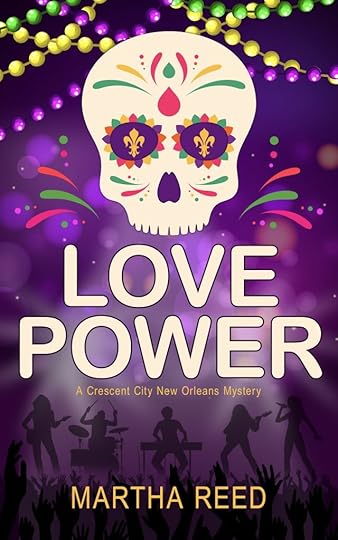
Love Power is the first in my new Crescent City NOLA Mystery series introducing disgraced ex-police detective Jane Byrne who blows into New Orleans on her Ducati motorcycle looking for a fresh start, never expecting to uncover a hate crime serial killer targeting NOLA’s inclusive LGBTQ community.
Jane’s new landlords, Leslie and Ken Pascoe and Leslie’s Aunt Babette, a mediumistic voodoo queen offer Jane a haven. Ken is the sole surviving remnant of The WarBirds, an ’80’s one-hit wonder heavy metal band whose single stadium anthem mega hit “Love Power” was one of the first music videos produced for MTV.
At a surprise birthday party we meet Gigi Pascoe, Ken and Leslie’s transgender daughter and Gigi’s two BFFs. After one of her friends goes missing, Gigi’s concern turns to fear that their LGBTQ world is being targeted for hate crime violence when a second friend vanishes.
Dissatisfied with the NOPD force and local FBI bureau agency responses, Jane and Gigi team up only to discover that their united effort has refocused the serial killer’s hate-filled intent on them.
Why use New Orleans for your setting?
My Nantucket mystery series was conceived as a three-book set and when I finished “No Rest for the Wicked” (Book 3) I started casting around for a new location where my characters could get into trouble. MAt first, I thought about using Las Vegas, but then I attended the 2016 Bouchercon crime fiction writer’s convention and after three days in NOLA I realized New Orleans was a place where you could get into real trouble. In the end, NOLA won my heart and stole my vote.
I also wanted to share NOLA’s jazzy insane excitement with my readers especially in our current environment when travelling is restricted.
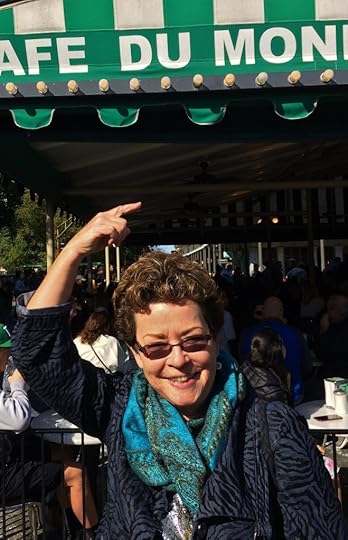 Martha the Cafe du Monde, NOLA
Martha the Cafe du Monde, NOLAWhy did you decide to include LGBTQ characters?
In 2014, at another Bouchercon in Long Beach, California, I heard some great general discussion about the lack of diversity in the crime fiction/mystery genre and in our writerly community. A friend of mine noted that while the mystery world had made some strides into including under-represented voices, we still had a long way to go with the LGBTQ community.
As soon as she said that the omission seemed odd to me. She was right, so I decided to create characters who represented different aspects of the queer world, to give them a voice. Of course, once I did that, Love Power’s main themes of gender definition and fluidity and political empowerment automatically rose to the surface and they needed to be addressed.
One reviewer noted that Love Power offers the opportunity of “allowing us to see the characters for who they are, not what they are and keeping me enthralled at what transpired from beginning to a surprising end.” I’m over the moon with that observation. It tells me I did my job right.
Are you working on anything now?
Yes! I’m busily drafting “Street Angel,” Book 2 in the Crescent City NOLA Mysteries now with a goal of meeting a mid-2021 publication date with Buccaneer, my indie publishing imprint. Bouchercon 2021 is returning to NOLA. I’d love to have two books in this series ready for it.
“Street Angel” will offer its own set of dark themes which I can’t share because they’re huge spoilers. I am having great fun researching and writing it and if the FBI or Homeland Security is reading this blog I’ll admit right now that my browser history is probably suspicious. I am a writer. It can’t be helped.
Do you think your writing will be changed by the COVID-19 crisis?
I can see using the COVID lockdown to increase a story’s suspense. Trapped in a house with a killer is the very definition of a locked room or country house mystery. I don’t currently have any plans of using it although that may change depending on my future story needs.
Is your process or routine different now?
Strangely, no. If I’m going to write a novel and put 85,000+ words down on the page, the process is the same as it’s always been. I show up every day, open my laptop, launch my manuscript, and get to work. My heart-felt sympathy goes out to those writers who are working from home while home-schooling the kids.
What’s the first thing you’re going to do when we’re free to be social again?
I’m going to travel! New Orleans is at the top of my list plus I can’t wait to attend the mystery and crime fiction conferences like Bouchercon, Malice Domestic, and Killer Nashville in person again. Online attendance is a great option, but there’s nothing better than overhearing the creative, insightful conversations and topics being discussed in a hotel bar.
Want to read a sample? Click here.
Martha Reed is the Independent Publisher (“IPPY”) Book Award-winning crime fiction author of the John and Sarah Jarad Nantucket Mystery series. Love Power is the first book in her new Crescent City NOLA Mystery series featuring transgender sleuth Gigi Pascoe.
Martha is an active member of the Florida Gulf Coast and the Guppies chapters of Sisters in Crime, Inc., Mystery Writers of America (MWA) and in a moment of great folly at Bouchercon 2016 she joined the New Orleans Bourbon Society (N.O.B.S.) Follow her on Facebook, Twitter @ReedMartha or visit her website reedmenow.com for more detail.
September 18, 2020
SHATTERING GLASS Sunday!
Please join us on Sunday for an all-star literary event! Free, of course. Find out more below (or here) or click through to join us here.

Details:
Meet some of the legendary, bestselling and critically acclaimed authors who donated time and work to Shattering Glass, the first non-profit anthology by non-profit publisher Nasty Woman Press! Discover why New York Times bestselling author Marcia Clark calls the collection “Moving, often poetic, and always compelling.” All profits from this unique work are donated to Planned Parenthood!
Readers and Participants Include:
 Robin C. Stuart (Facilitator)
Robin C. Stuart (Facilitator)Robin C. Stuart is a veteran cybercrime investigator and contributing author to the short story anthology, Fault Lines: Stories by Northern California Crime Writers. She consults on all things cyber security for Fortune 100 companies, authors, screenwriters, and media outlets including BBC and NowThis News. Robin is also a significant contributor to the Tech Interactive (formerly known as The Tech Museum of Innovation) acclaimed Cyber Detectives, one of the museum’s most popular permanent exhibits, which earned praise from the Obama Administration.
 Kelli Stanley (Introduction/MC)
Kelli Stanley (Introduction/MC)Kelli Stanley is the critically acclaimed and multiple-award winning author of the Miranda Corbie noir series set in 1940 San Francisco, including City of Dragons, City of Secrets, City of Ghosts, and City of Sharks. Other works include historical mysteries set in Roman Britain and numerous short stories and essays. A Los Angeles Times Book Prize Finalist, her proudest achievements have been her inclusion as a literary heir of Dashiell Hammett by his granddaughter in Publisher’s Weekly, and her founding of Nasty Woman Press on November 9th, 2016. Her next novel is set in 1985 in Humboldt County, California. kellistanley.com
 Maria Alexander
Maria AlexanderMaria Alexander is a multiple award-winning author of horror and mystery fiction. Since 1999, her short fiction has appeared in critically acclaimed publications and anthologies. She also writes humorous mystery fiction under the pen name Quentin Banks. No Rhyme Goes Unpunished is her debut thriller satire. Death on the Argyle is due out Summer 2020. For more information, visit her website at mariaalexander.net.
 Eric Beetner
Eric BeetnerEric Beetner is that writer you’ve heard about but never read. When you finally do, you wonder why you waited so long. There are more than 20 books like Rumrunners, All the Way Down, and The Devil Doesn’t Want Me, so you’d better get started. He also hosts the podcast Writer Types and the Noir at the Bar reading series in L.A.. He’s been described as “The 21st Century’s answer to Jim Thompson” (LitReactor), has been nominated for three Anthonys, an ITW award, Shamus, Derringer and 5 Emmys. Seriously, what are you waiting for? ericbeetner.com
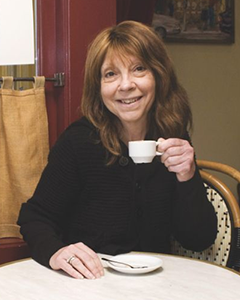 Cara Black
Cara BlackCara Black is the New York Times bestselling author of nineteen of the Aimée Leduc investigations set in Paris, including the most recent, Murder in Bel-Air. The Wall Street Journal said of her Murder on the Left Bank, “Even after 17 books, Ms. Black has intriguing corners of Paris to reveal—from an enclave of ateliers once home to the likes of Gauguin and Rodin to a crime-ridden neighborhood where ‘no one wanted to be witnessed witnessing’.” She has received multiple nominations for the Anthony and Macavity awards. In Paris she was awarded the Medaille de la Ville de Paris in recognition of her contributions to French culture. Cara gets to Paris whenever she can for research. She lives in San Francisco with her husband and dog. Find her at carablack.com
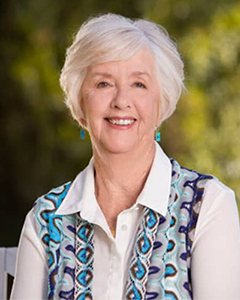 Rhys Bowen
Rhys BowenRhys Bowen is the New York Times bestselling author of more than forty novels, including The Victory Garden, The Tuscan Child, and the World War II-based In Farleigh Field, the winner of the Left Coast Crime Award for Best Historical Mystery Novel and the Agatha Award for Best Historical Novel. Bowen’s work has won twenty honors to date, including multiple Agatha, Anthony, and Macavity awards. Her books have been translated into many languages, and she has fans around the world, including seventeen thousand Facebook followers. A transplanted Brit, Bowen divides her time between California and Arizona.
 Angel Luis Colón
Angel Luis ColónAngel Luis Colón is the Derringer and Anthony Award nominated writer of five books including his latest novel, Hell Chose Me. In his down time, he edits anthologies and produces The Bastard Title, a podcast featuring interviews with writers. Keep up with him on Twitter via @GoshDarnMyLife. angelluiscolon.com
 Wendy Corsi Staub
Wendy Corsi StaubWendy Corsi Staub is the New York Times and USA Today bestselling author of more than 90 novels over a 27-year career. Her latest psychological suspense novels Little Girl Lost and Dead Silence (William Morrow) launched a psychological suspense trilogy that concludes with The Butcher’s Daughter. A three-time finalist for the Simon and Schuster Mary Higgins Clark Award, she’s won an RWA Rita Award, an RT Award for Career Achievement in Suspense, the RWA-NYC Lifetime Achievement Golden Apple and been honored five times with the WLA Washington Irving Prize for Fiction. She lives in New York. wendycorsistaub.com.
 Allison A. Davis
Allison A. DavisAllison A. Davis writes poetry (most recently, Three Rooms Press Annual Dada Magazine, Maintenant 12 and 13), short stories, and is currently shopping her novel, But Not For Me. A background in journalism and art criticism, her day job is a senior partner at Davis Wright Tremaine LLP, a national law firm.
 Danny Gardner
Danny GardnerDanny Gardner is a multi-award-nominated author of genre fiction, including A Negro and an Ofay, his debut mystery novel. In another world, he is a stand-up comedian and screenwriter, and also the founder of Bronzeville Books. Born and raised in the Chi, he lives and works in Los Angeles. www.bronzevillebooks.com
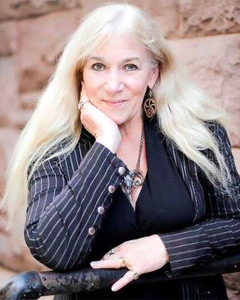 Heather Graham
Heather GrahamHeather Graham is a legendary New York Times and USA Today bestselling author of more than two hundred novels and novellas, published in twenty-five languages. She has been honored with awards from booksellers and writers’ organizations, including the Silver Bullet and prestigious Thriller Master awards from the International Thriller Writers and the Lifetime Achievement Award from Romance Writers of America. Heather’s books have been selected for the Doubleday Book Club and the Literary Guild, and she has been quoted, interviewed, or featured in such publications as The Nation, Redbook, People, and USA Today, and has appeared on many newscasts including Today and Entertainment Tonight. www.theoriginalheathergraham.com
 Rachel Howzell Hall
Rachel Howzell HallRachel Howzell Hall, author of the bestseller They All Fall Down (Forge), writes the acclaimed Lou Norton series. She is also co-author of The Good Sister with James Patterson, which was included in the New York Times bestseller The Family Lawyer. She is on the board of directors for the Southern California chapter of Mystery Writers of America, and lives in Los Angeles. Her next novel And Now She’s Gone will be published September 2020. www.rachelhowzell.com
 Libby Fischer Hellmann
Libby Fischer HellmannLibby Fischer Hellman left a career in broadcast news in Washington, DC and moved to Chicago 35 years ago, where she, naturally, began to write gritty crime fiction. Twelve novels and twenty short stories later, she claims they’ll take her out of the Windy City feet first. She has been nominated for many awards in the mystery and crime writing community and has even won a few. With the addition of Jump Cut in 2016, her novels include the now five-volume Ellie Foreman series, which she describes as a cross between Desperate Housewives and 24; the hard-boiled 4-volume Georgia Davis PI series; and three stand-alone historical thrillers that Libby calls her “Revolution Trilogy.” Last fall The Incidental Spy, a historical novella set during the early years of the Manhattan Project at the U of Chicago was released. Her short stories have been published in a dozen anthologies, the Saturday Evening Post, and Ed Gorman’s 25 Criminally Good Short Stories collection. In 2005 Libby was the national president of Sisters In Crime, a 3500 member organization dedicated to the advancement of female crime fiction authors.
 Toni L.P. Kelner
Toni L.P. KelnerToni L.P. Kelner is actually two authors in one. As Toni, she’s written eleven mystery novels and co-edited seven anthologies with Charlaine Harris. She won the Agatha for Best Short Story, and has been nominated for the Anthony, the Macavity, and the Derringer. As Leigh Perry, she writes the Family Skeleton mysteries featuring adjunct professor Georgia Thackery and her pal Sid, an ambulatory family skeleton. The Skeleton Stuffs a Stocking is the most recent.
 James L’Etoile
James L’EtoileJames L’Etoile uses his twenty-nine years behind bars as an influence in his novels, short stories, and screenplays. He is a former associate warden in a maximum-security prison, a hostage negotiator, facility captain, and director of California’s state parole system. He is a nationally recognized expert witness on prison and jail operations. He has been nominated for the Silver Falchion for Best Procedural Mystery, and The Bill Crider Award for short fiction. His published novels include At What Cost, Bury the Past, and Little River: The Other Side of Paradise.
 Catriona McPherson
Catriona McPhersonCatriona McPherson is the national best-selling and multi-award-winning author of the Dandy Gilver series of preposterous detective stories, set in her native Scotland in the 1930s. She also writes darker contemporary standalone suspense and has recently begun the Last Ditch trilogy, loosely based on her immigrant experience in a northern California college town. Catriona is a proud lifetime member and former national president of Sisters in Crime, committed to advancing equity and inclusion for women, writers of color, LGBTQ+ writers and writers with disability in the mystery community.
 Travis Richardson
Travis RichardsonTravis Richardson is originally from Oklahoma and lives in Los Angeles with his wife and daughter. He has been a finalist and nominee for the Macavity, Anthony, and Derringer short story awards. He has two novellas and his short story collection, Bloodshot and Bruised, came out in late 2018. Find out more at tsrichardson.com
 Kaira Rouda
Kaira RoudaKaira Rouda is an award-winning journalist and marketing executive best known for creating the first women consumer focused real estate brand, “Real Living.” Her first book, Real You Incorporated: 8 Essentials for Women Entrepreneurs encourages women to put their passions into action and create the life of their dreams. She took her own advice, began writing novels, and is now an international bestseller. She lives in Southern California with her family. Her latest book is The Favorite Daughter. Visit KairaRouda.com for more.
 Clea Simon
Clea SimonClea Simon is a former journalist and the Boston Globe-bestselling author of three nonfiction books and more than two dozen mysteries. While the majority of these (like her most recent, An Incantation of Cats) are amateur sleuth mysteries, she also writes darker crime fiction, like the rock and roll suspense novel World Enough, which was named a “must read” by the Massachusetts Book Awards. Her upcoming psychological suspense Hold Me Down returns to the music world, focusing on sexual abuse and recovery, as well as love in all its forms. She can be reached at cleasimon.com
 Alexandra Sokoloff
Alexandra SokoloffAlexandra Sokoloff is the Thriller Award-winning, Bram Stoker, and Anthony Award-nominated author of thirteen bestselling supernatural and crime thrillers. The New York Times has called her “a daughter of Mary Shelley” and her books “Some of the most original and freshly unnerving work in the genre.” As a screenwriter she has sold original scripts and written novel adaptations for numerous Hollywood studios. She is also the author/presenter of the internationally acclaimed Screenwriting Tricks for Authors workbooks, workshops, and blog. Her Thriller Award-nominated Huntress Moon series follows a haunted FBI agent on the hunt for a female serial killer, smashing genre clichés and combatting the rise of violence against women on the page, screen and life. alexandrasokoloff.com
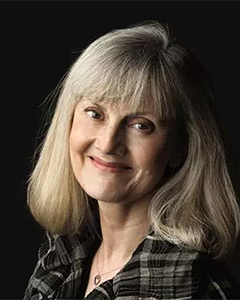 Jacqueline Winspear
Jacqueline WinspearJacqueline Winspear is the creator of the New York Times and National Bestselling series featuring psychologist and investigator, Maisie Dobbs. Her first novel—Maisie Dobbs—received numerous award nominations, including the Edgar Award for Best Novel and the Agatha Award for Best First Novel. It was a New York Times Notable Book and a Publisher’s Weekly Top Ten Pick. Her standalone novel, The Care and Management of Lies, was a finalist for the Dayton Literary Peace Prize in 2015. In 2019 Jacqueline published her 16th novel, The American Agent, and a non-fiction book, What Would Maisie Do? a journal featuring excerpts from the Maisie Dobbs’ series. jacquelinewinspear.com
Nasty Woman Press
We are a 501 (c)(4) non-profit publisher pledged to fight fascism, racism, misogyny, anti-Semitism, homophobia, Islamophobia, transphobia, and bigotry while promoting human rights and civil rights in the United States and around the globe. As writers, readers, editors, artists, librarians, designers, publishing professionals, and creative, principled human beings, we cherish the planet and our fragile environment, support science and education, and value health and social services. We believe in taking care of each other. We believe in a better, kinder, world. Every Nasty Woman Press anthology is created around a theme; that theme is linked to the non-profit to whom profits from the sale of that book will be donated. Shattering Glass is the first of our anthologies. Profits from this book will be donated to Planned Parenthood. For more information or to become a member, please visit nastywomanpress.com.
September 7, 2020
Cover reveal: A CAT ON THE CASE
Presenting A CAT ON THE CASE, the third Witch Cats of Cambridge mystery, to be published in January 2021 by Polis Books. Doesn’t she look intent on solving this one?
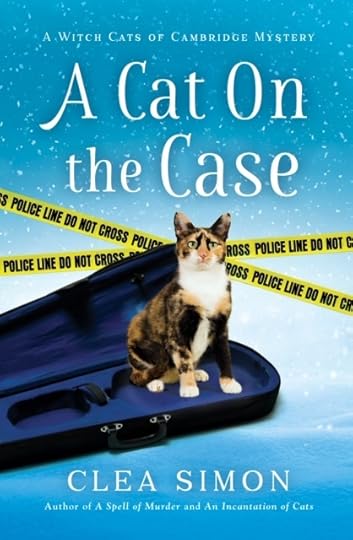
When a panicked stranger shows up at Charm and Cherish, Becca Colwin feels compelled to help. But when that stranger then disappears, leaving behind her heirloom violin the aspiring witch detective is drawn further into a web of deceit and intrigue complicated by a history that only Becca’s three magical cats truly understand.
August 26, 2020
A last beach read: Ursula Hegi’s “Patron Saint…”
My review of Ursula Hegi’s wonderful latest novel ran in the Boston Globe:
BOOK REVIEW
A story of motherhood, madness, and love in ‘The Patron Saint of Pregnant Girls’
By Clea Simon Globe Correspondent, August 13, 2020
Seaside light can make reality less harsh. Hazy and diffuse with moisture, bright with reflection, it lends its subjects a particular glow. In “The Patron Saint of Pregnant Girls,” her 11th novel, Ursula Hegi uses that illumination to cast a dream-like spell over the community of Nordstrand, Germany, for a lyrical meditation on motherhood and mourning.
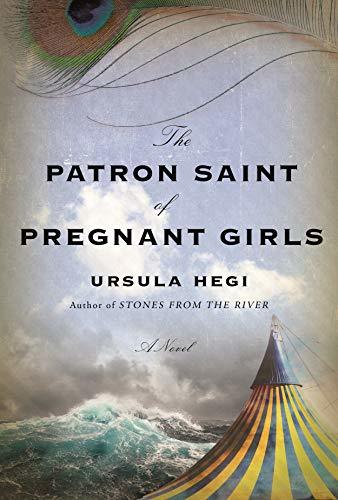
August 1879 and Nordstrand, a small island in the Nordsee, is at its best. The Ludwig Zirkus has arrived for its annual appearance, setting up its tent on the grounds of St. Margaret’s Home for Pregnant Girls in exchange for tickets, to everyone’s delight. But as one family wends its way home over the tidal flats, wading happily in “the sun’s water,” a freak occurrence — a “hundred-year wave” — takes three children, tearing them from their mother Lotte’s grasp. During the search, the pregnant Tilli — a St. Margaret’s girl — goes into labor, while Sabine – the circus’s costumer and a mother herself — seeks to support the grief-maddened Lotte. As the waters recede with no sign of the missing children, these three will grow increasingly entwined through love, grief, and healing.
Motherhood poses unique challenges to these women. Lotte’s situation is the most obvious, but the problems increase as her loss incapacitates her from caring for her surviving child, the infant Wilhelm. Sabine, a single mother, struggles to protect her daughter Heike, who, although physically adult, has the cognition of an 8-year-old. “Lotte used to think how devastating it must be for Sabine to raise such a child. But now — she shivers.” Tilli, meanwhile, is a child herself. At just 11 years old, she is lucky to survive giving birth. Rejected by her family — who choose to keep the twin brother who impregnated her — she is also reeling from the loss of her baby, surrendered for adoption.Get HomeFront in your inboxThe Weekender is temporarily HomeFront, your guide to the best ways to stay entertained at home any day of the week.Sign Up
How these three cope is at the center of this book, and Hegi doesn’t shy away from their pain, which manifests in the details. Lotte bargains fruitlessly: “The one in my arms for the other three,” while Tilli wakes to disorientation: “and the infirmary is dark and keening and she’s terrified of the keening and of the empty where her own girl — is? — was?”
These losses are compounded when Kalle, Lotte’s overwhelmed husband, runs away with the circus when it leaves, a betrayal that prompts Sabine to recall her own abandonment and the realization that Heike — “body of a woman, mind of a child” — will never be able to deal with the responsibilities of motherhood. Life is difficult for all, of course, but particularly the women of Nordstrand, and the cemetery has its portion of “mothers who die in childbirth and are buried with their infants — born dead, or alive for just a few hours,” who come to include TIlli’s friend, Marlene.
But Hegi is gentle with her characters, offering them consolation in their shared humanity. An abused wife finds comfort with the loving fisherman she jilted long ago, while the son of the circus’s ringmaster learns in the most prosaic way that his aging father views his male partner as family. Even the nuns who run St. Margaret’s are warm and understanding of their young charges, with idiosyncrasies and appetites of their own. Sister Hildegund, for example, takes undue pride in her fantastical — and frighteningly bad — paintings of the house’s patron saint and a dragon, but proves herself to be more pragmatic when confronted with lesbian relationships among the order.
“This is not right,” she confronts the sister caught sneaking down the hall one night. “You wake everyone up traipsing back and forth,” she says, before solving the problem by moving the lovers to adjoining cells.
Cast largely as a series of intimate vignettes, these everyday interactions are depicted with a sensitivity that gives these most human of relationships their proper weight. Narrated by a succession of characters, they are beautiful in their specificity. The priest, for example, “knows all the sisters by their confessions: Sister Ida is secretive; Sister Elinor takes pride in her body; Sister Konstanze prefers birds to humans.” In Hegi’s precise, almost imagistic prose, such quotidian scenes come to seem as magical as the miracle Sister Hildegunde is constantly attempting to paint. After Kalle “leaps into the dory of the beekeeper who lunges for the oars, arms silver with pale hairs, like a god who will go beneath the sea to bring back your children,” other legends, such as one about the lost island of Rungholt that can be reached only once each spring, seem feasible.
No surprise, then, that when Lotte’s madness threatens another tragedy, it will be their communal experience that draws these three mothers — and their families — together, ultimately transforming them all.
THE PATRON SAINT OF PREGNANT GIRLS
By Ursula Hegi
Flatiron Books, 288 pp., $26.99
Clea Simon’s latest novel is “An Incantation of Cats.” She can be reached at www.cleasimon.com .
August 24, 2020
#NoContact Book Tour with Leslie Budewitz
What a joy to see Leslie Budewitz again, even if the meet-up is virtual. In addition to being a former president of Sisters in Crime, Leslie is the first author to have won Agatha Awards for both fiction (Death al Dente) and nonfiction (Books, Crooks & Counselors: How to Write Accurately About Criminal Law and Courtroom Procedure; yes, Leslie is a lawyer). Today, though, we’re talking about The Solace of Bay Leaves, which in these odd times is out now as an e-book and audiobook and will come out as a paperback in October. However you prefer to read, this fifth Seattle Spice Shop mystery will add some flavor to your life.

Tell us about your book!
Thanks, Clea! The Solace of Bay Leaves is the fifth Seattle Spice Shop mystery. When her life fell apart at age 40, Pepper Reece never expected to find solace in bay leaves—a comment she often makes and the source of the title. But her impulsive purchase of the Spice Shop in Seattle’s famed Pike Place Market turned out to be one of the best decisions she ever made. Between selling spice and juggling her personal life, she also discovers another unexpected talent – for solving murder.
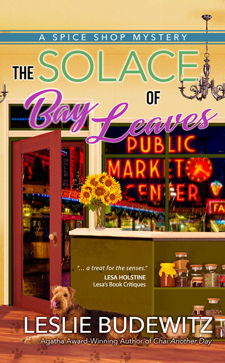
And she loves the tasty turn her life has taken. But when evidence links a friend’s shooting to an unsolved murder, her own regrets surface. Can she uncover the truth and protect those she loves, before the deadly danger boils over?
It’s a book that celebrates my love of the Market and Seattle’s historic neighborhoods, explores the great joy and occasional pain of long-time friendships, and digs into the choices people make to get what they think they deserve. And, soup.
Are you working on anything now? Is your process or routine different?
I’ve just turned in Bitterroot Lake, my first stand-alone, scheduled for April 2021 from Crooked Lane Books. When a young widow returns to her family’s lakeside Montana lodge in search of solace, murder forces her to reconnect with estranged friends and confront everything she thought she knew about the tragic accident twenty-five years ago that tore them apart.
Writing a book on a deadline in the middle of a pandemic is pretty much guaranteed to induce a pressure-filled panic, and sure enough, it did happen. I’d experienced a similar freak-out with Solace, when I realized halfway through the first draft that I didn’t know what the book was really about. Fortunately, my subconscious did know, and once it told my conscious mind that the key to Solace was Pepper’s relationship with Maddie Petrosian, an old friend gravely wounded in a shooting, and her discovery of secrets in Maddie’s family history, the book practically finished itself. The same was true of Bitterroot Lake, and the knowledge that I had written my way through a similar previous experience was the push I needed.
But after that, I thought it wise to give my poor brain a bit of a summer break. I’m writing short stories and working on a new series proposal, and spending as much time as I can with the cat on my lap and a book in my hand.
Do you think your writing will be changed by this crisis?
I hope so. Why waste a good crisis, right? What I mean is, we should all hope that difficult experiences change us, for the better; that they remind us what’s important and what matters most. I write stories about women’s lives, with crime, and I hope that this time will help me dive even deeper into the sweet, frustrating, astonishing, disappointing, heart-warming and heart-breaking world—on the page.
What’s the first thing you’re going to do when we’re free to be social again?
Go to a reading or a gallery opening! I miss readers and book people, artists and art lovers. I miss sitting or standing with them listening to a writer or painter talk about their work, inviting us into their secret lives, then buying a book to be signed or drooling, from a safe distance, over a painting. Art illuminates, and time with artists, of all media, inspires.
Thanks for letting me visit with you, Clea!
Thank you, Leslie!
August 4, 2020
Fiction in the Pandemic
How do we create worlds when the real one is falling apart? I tackle that dilemma in today’s Boston Globe

Arts have long served as humanity’s means of processing reality. But as we reel from continued global crises, what stories are going to emerge from these odd and troubled times?
With so many of the arts hobbled by the pandemic, fiction should be thriving. Unlike any of the performing arts, writing is a solitary profession, one that does not require the physical presence of an audience. Even more than pursuits like painting and photography, which can require some collaboration, writing is best done in isolation. We have the ultimate “work from home” profession. But even as it is by nature removed from the world, much of fiction relies on realism, or some semblance of it. We call it “world building,” creating credibility for our characters and their lives. But what kind of world do we build now?
Read more here: https://www.bostonglobe.com/2020/08/0...
July 24, 2020
EC Ambrose joins the #NoContact Book Tour
This week I’m welcoming fantasy mistress Elaine Isaak (aka E.C. Ambrose) to the #NoContact Book Tour! While we all stay inside and stay safe, books have become even more important – and books that include a touch of magic in their adventures are even more welcome. So please read on (or sail off) with Elaine/EC on her latest, The King of Next Week!
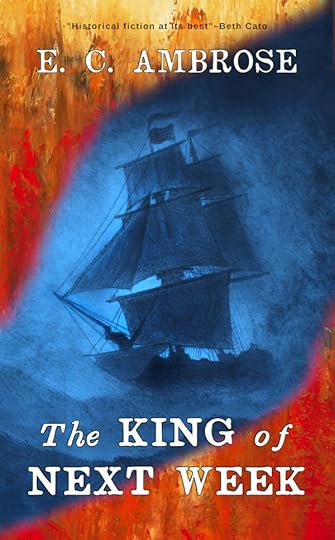
Tell us about your book!
My latest release is The King of Next Week, from Guardbridge Books!, It’s a historical fantasy novella about a Civil War veteran who sails from Maine with a load of ice and comes home with a Djinn wife. The story sprang from a vacation in Phippsburg, Maine, the location of the Popham colony, where the first rigged wooden vessel in North America was built in 1609. The penninsula has a rich history, densely packed into rocky shores, pine forests—and ice ponds. I’ve always been fascinated by the idea of New Englanders in the 19th century making fortunes by shipping ice to India. It’s historical, it’s romance. . .three wishes, and a woman who can literally set fires with a touch. What could possibly go wrong?
Are you working on anything now? Is your process or routine different?
I am putting the finishing touches on The Assassin’s Throne, the third volume in my Bone Guard series of international thrillers—those are a blast to research and to write. I hope to get that book out in September, by which point book one, The Mongol’s Coffin, will be out in audio. And I have begun researching and brainstorming a historical novel revolving around the technology of the early Greco-Roman period.
The most difficult adjustment for me has been my family being home all the time now. I used to wave goodbye at the door and send my husband off to work, my son off to school (or occasional summer camp). My daughter’s freshman year in college transformed rather abruptly, as did her summer opportunities. We’ve found a decent balance at this point, but it’s different accomodating other people during the day, when I used to have the house all to myself to write. I think it has ultimately made my process more robust—when I have the time, I try to take full advantage.

Do you think your writing will be changed by this crisis?
The Covid crisis has brought along with it a number of other flashpoints that are making me consider more deeply the kinds of things I want to write about and where my energy is best spent. I’ve never been a light-and-fluffy kind of writer in any case (my Dark Apostle series is about medieval surgery, and ends in the plague years) so I think this period of deeper contemplation will help me develop more layers—polishing the sparks of joy we’ve come to cherish, as well as being unafraid to face the wells of darkness.
What’s the first thing you’re going to do when we’re free to be social again?
run away!!!! Oh, maybe not. But seriously, I am very much looking forward to being comfortable travelling again. I’ve missed my conventions, and my in-person writing groups, even locally. And when I do see them, I want to be able to hug.
E. C. Ambrose writes knowledge-inspired adventure fiction including The Dark Apostle series about medieval surgery, The Singer’s Legacy fantasy series as by Elaine Isaak, and the Bone Guard international thrillers as by E. Chris Ambrose. . In the process of researching her books, Elaine learned how to hunt with a falcon, clear a building of possible assailants, and pull traction on a broken limb. Her short stories have appeared in Fireside, Warrior Women and Fantasy for the Throne, among many others, and she has edited several volumes of New Hampshire Pulp Fiction. A graduate of the Odyssey Writing Workshop, Elaine has returned there to teach, as well as at conventions and writer’s groups across the country. She has judged writing competitions from New Hampshire Literary Idol to the World Fantasy Award. Elaine dropped out of art school to found her own business. A former professional costumer and soft sculpture creator, Elaine now works as a part-time adventure guide. In addition to writing, Elaine creates wearable art employing weaving, dyeing and felting into her unique garments.
July 17, 2020
David Mitchell’s “Utopia Ave” is a bit rocky
A review of Mitchell’s latest for the Arts Fuse.
Book Review: “Utopia Avenue” — A Broken Record?
JULY 17, 2020 LEAVE A COMMENT
By Clea Simon
These days, I worry that David Mitchell is losing touch with reality.
Utopia Avenue by David Mitchell. Random House, 592 pp., $30
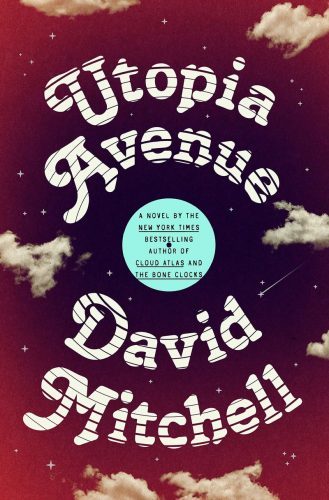
Creating – making any kind of art – requires a form of split personality. Like a person suffering from delusions, the artist must experience that which isn’t – seeing the impossible. Hearing voices. That’s the source of the creativity. However, to shape these visions into a work of art the creative person must also be relentlessly pragmatic. The artist has to maintain a sense of what works in the real world and be willing and able to prune back the wild imaginings into something that the rest of humanity can make sense of.
These days, I worry that David Mitchell is losing touch with reality.
Mitchell’s new novel, Utopia Avenue, creates – or, really re-creates – a world of intense imaginative abundance: the English music scene of the late ‘60s. It opens, like a classic rags-to-riches tale, at a low point: Dean Moss, a bassist who has been kicked out of his band, is about to be robbed of his rent money – the first in a series of catastrophes that costs him his job and lands him homeless, in a bar, where he is spotted by a “bookish-looking” stranger, Levon Frankland, with dubious intentions.
Dean needn’t worry – yet. Levon’s aim is to take Dean to hear a failing blues band, headed by a has-been who is being propped up by a monster drummer, the decidedly working-class “Griff” Griffin, and an upper-class guitarist, Jason De Zoet, who happens to be a psychedelic genius. (Think of a white, half-Dutch Jimi Hendrix.) Before long, he’s put them together with a buxom – and recently heartbroken – folkie, Elf Holloway. The resulting band, Utopia Avenue, works, for a while, as does Mitchell’s novel. Fully inhabiting his young creatives, he follows them through the trials of life – love and sex, birth and death – as they come together as a band, with chapters about their individual histories neatly slipping in backstory and providing context as they drive around in their broken-down van, the Beast, rubbing the rough edges off each other on the way to fame.
The five – Levon plays a lesser role but has his revelations as well – are not alone. Drawing on Brian Eno’s idea of the “scenius,” Mitchell depicts a world where everything contributes to the creative ferment. Love and drugs in many combinations, sure, but also the presence of a community in which art and experimentation are encouraged. Cameos by stars from John Lennon and David Bowie to Brian Jones and Frank Zappa, as well as scenesters like the plaster casters, toggle between gimmicky and fun, as do the references to real-life incidents (notably the sexual encounter between Janis Joplin and Leonard Cohen in the Chelsea Hotel).
At times, Mitchell seems out of his league in describing music – a notoriously difficult pursuit. Although he usually avoids cliché (barring the expected “meteoric” guitar solos), his customary detailed and poetic visualizations tend toward word salad when trying to capture sound: That can be playful, as when “Elf’s Hammond gatecrashes the party, finds its feet, and dances a drunken jig.” At other times, as when Joni Mitchell (in another cameo) “pulses, dives, aches, swivels, regrets, consoles, avows” as she sings, the list of verbs cancels itself out.
There’s so much here – art in a changing world, class and culture differences – that for a long time this hefty novel works. But in what could be described as a fall into classic rock and roll excess, Mitchell can’t resist fiddling – throwing in so many extra fillips and turns that he ruins the beauty of the tune. In Mitchell’s case, the fussing comes largely in the form of references to his earlier works, an increasingly common occurrence in his books. The first time one of these references pops up it feels witty, a tip of the hat to the long-time reader already invested in what fans call the “Mitchellverse.” For me, it was the appearance of “The Cloud Atlas Sextet” by Robert Frobisher, a nod to the composer in Mitchell’s Cloud Atlas, that is discovered by De Zoet after a night with Mecca, an Astrid Kirchherr-like photographer. That Utopia’s DeZoet is related to the protagonist of Mitchell’s The Thousand Autumns of Jacob De Zoet (his great-great-great grandson, we eventually learn) is an equally unobtrusive nod to an earlier work. But before long references to these two books, as well as The Bone Clocks, Slade House, Black Swan Green, and Number Nine Dream, are taking over the plot, and undermining its coherence.
 Author David Mitchell. Photo: Facebook
Author David Mitchell. Photo: FacebookThe problem is not in the allusions. It is that the narrative diverts to the styles of these earlier works, most notably the fantasy/horror of Bone Clocks and Slade House. De Zoet, we learn early on, appears to be on the autism spectrum. He works hard to translate emotions when in the presence of “Normals,” and both his awkwardness and his talent for masking draw on Mitchell’s writings about his own son. As the book progresses, we learn that the guitarist is also haunted by what appears at first to be an aural hallucination: a “knock knock” sound that may relate to his mother’s burial at sea. When that recurring sound is joined by apparent visual hallucinations – he sees the face of an Asian monk – it would seem that De Zoet’s undefined mental illness is worsening, a not unlikely development in a young artist in a drug-fueled scene. Rather than trust his character and letting this very real issue play out, however, Mitchell links the face to supernatural elements in the earlier books, tipping the book into science fiction.
Fantasy of this sort has become a Mitchell forte, and here serves as the kind of self-referential touch that may thrill diehard fans, as visual Easter eggs in superhero movies do for fans of the original comics. But for other readers – casual fans enjoying a historical rock-world novel or, god forbid, first-time readers unaware of Mitchell’s legacy – it’s maddening. Is this a book built on character? On individuals struggling to create art in the face of ordinary life crises? Or is it horror peopled by body-stealing demons? The two styles work at odds, and worse, and an extended detour involving generational regression via “mnemo-parallax” in pursuit of the 200-year-old monk Enomoto frankly wreaks of self-indulgence, draining the human storyline of its power. Although Mitchell pulls his narrative back for an emotionally appropriate conclusion (barring one reference to an apparent 10-year-old who claims to be 808), it’s too little too late. He’s lost the beat.
Some critics are already using the “broken record” metaphor for Utopia Avenue, largely because of its extended self-references. To these ears the novel plays more like a homemade mixtape. Everything we love about Mitchell is here – the wordplay, the imagery – but the tape’s been used too often. Old voices, fragments of former hits, keep breaking through, and what was charming the first time around has now become disruptive, interrupting what could have been a heady groove.
Clea Simon’s rock-world novel World Enough was named a “must read” by the Massachusetts Book Awards. Her next, Hold Me Down, will be published by Polis Books in September 2021. She can be reached at www.CleaSimon.com
[image error]
June 25, 2020
And that other book?
Some of you noticed that second book in the announcement… Hold Me Down. Yes, I’ve written another music-world mystery, or as my publisher calls it, “a standalone novel of suspense.” It’s dark, it’s intense, and, no, there are no cats in it. Still, I’m very proud of Hold Me Down, which looks like it will be published (again by Polis) in September, 2021.
I had originally described HOLD ME DOWN as a “rock and roll noir” in the style of my Mass. Book Award-honored WORLD ENOUGH, that follows a recovering rock star as she unravels a mysterious killing – and her own past – in the context of an industry that monetizes dysfunction. Here’s the official deals report – a tad more standardized in terms of description!

Anyway, no cover or links yet, but I am VERY excited to have placed this book and I can’t think of a better home! More as I know it!
June 24, 2020
More witch cats to come!
It’s official! A Cat on the Case, the third Witch Cats of Cambridge cozy mystery, will be published by Polis Books on Jan. 16, 2021, and can be pre-ordered now.
When a panicked stranger shows up at Charm and Cherish, Becca Colwin feels compelled to help. But when that stranger then disappears, leaving behind her heirloom violin the aspiring witch detective is drawn further into a web of deceit and intrigue complicated by a history that only Becca’s three magical cats truly understand.
January 2021? Maybe I’ll even be able to visit bookstores by then…



